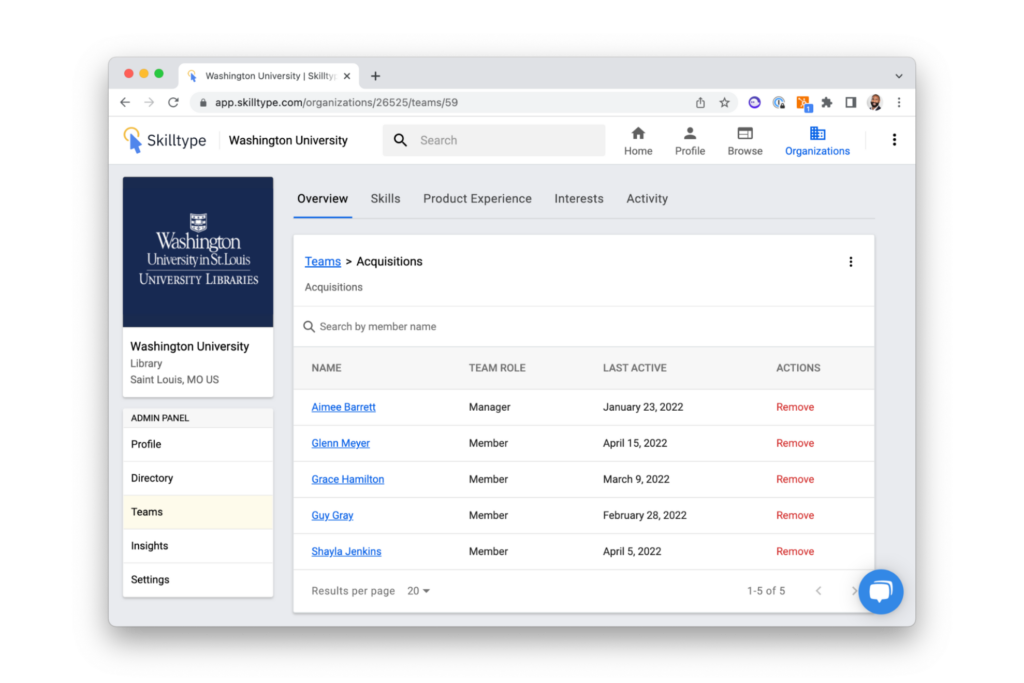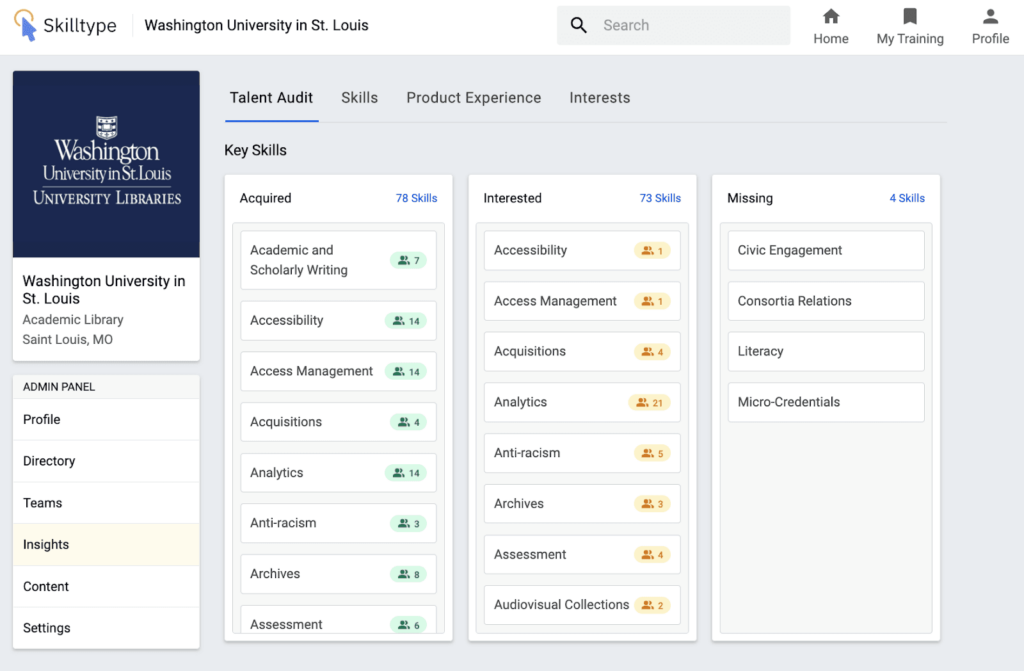
Associate University Librarian Jackie Lorrainne, representing Washington University Libraries, and Christine Quirion, COO of Skilltype, continued the discussion sparked by their presentation at the CNI Spring 2023 Membership Meeting. The resulting virtual webinar, “Data-Driven Organizational Development at Washington University in St. Louis,” offered a comprehensive analysis of the intricate nature of the talent landscape within libraries and how the application of up-to-date, standardized data can aid in overcoming prevalent challenges.
To obtain a recording of the webinar ‘Data-Driven Organizational Development at Washington University in St. Louis,’ please complete request form.
Washington University Libraries and Their Organizational Development Strategy
The Washington University Libraries have prioritized staff development, ensuring their human resources strategy advances their strategic plan. An essential element of this approach is the integration of Skilltype into their Libraries 101 staff onboarding initiative. This program facilitates a thorough orientation into the responsibilities and expectations of library work and the broader role of the university. The job descriptions for both staff and managers underline the necessity of continuous growth and skill development.
Shifting Towards Skills-Oriented Recruitment
Managers are encouraged to foster team skills, advocating for a shift from degree-centric hiring practices towards skills-oriented recruitment. This pivot aims to enrich the library’s access to abilities and align more closely with Inclusion, Diversity, Equity, and Accessibility (IDEA) objectives.
The Washington Libraries plans to extend the reach of Skilltype beyond existing staff to include student employees and members of the student advisory group, thereby advocating for library-related careers. Furthermore, the libraries have initiated a strategic staffing plan for the next one, three, and five years, identifying areas requiring cultivation and recruitment to align strategic priorities, people strategy, and IDEA goals.

In their quest to build a vibrant and diverse talent pipeline, the WUSTL libraries have also formed alliances with various community entities such as campus HR, non-profit organizations, and staffing agencies. These partnerships aim to attract candidates with broad backgrounds and skill sets.
Skilltype’s Role in Extending Organizational Development Initiatives
Skilltype is a key partner in WUSTL’s comprehensive talent strategy, supplying a robust data foundation and frequent prompts and reminders to enhance staff engagement within the learning organization. With its standardized competencies, roles, and training resources, Skilltype aids in achieving organizational alignment and fostering a keen focus on addressing community needs. Staff members are encouraged to identify and leverage their strengths, aligning them more closely with the library’s vision, mission, and values.
Skilltype’s Talent Audit is a powerful feature, providing deep insights into current skills, roles, and potential gaps within the organization. This allows managers to incorporate staff skills, product experience, and interests into regular check-ins. By highlighting key skills in each organization’s profile, staff members can comprehend the impact of their work and needs. Libraries can model future staffing scenarios through the Talent Audit by modifying key skills. The Talent Audit enables libraries to develop short and long-term staffing strategies to supplement existing skills and mitigate skill gaps when filling vacant roles.
Best Practices for Data-Driven Organizational Development
For institutions seeking to implement data-driven organizational development strategies, several practices are worthy of consideration:
- Integrate Skilltype into your organization’s onboarding process by sharing your invitation link via your “Libraries 101” staff development webpage or performance appraisal website.
- Utilize Skilltype Lists to disseminate resources, such as training materials indexed by Skilltype and those created by your organization.
- Establish specific expectations for continuous learning in the position descriptions of managers, team leaders, and staff.
- Develop learning goals within the performance cycle considering staff interests, prior learning activity, and organizational needs. This information is available to Team Managers through each Team’s dashboard.
- Conduct regular check-ins between managers and staff. When all information about staff skills, product experience, and interests is accessible in one place, it can yield significant benefits.
- Get a panoramic view of your organization’s skills, roles, and potential gaps with Skilltype’s Talent Audit. Modifying the critical skills in each library’s profile can aid in planning for one, three, or five-year staffing scenarios.
- When advertising new positions, reference the Talent Audit to ensure each role’s capacity to complement current skills and reduce skill gaps.
For libraries wishing to explore tailored strategic approaches, the Skilltype sales team can offer a detailed exploration of potential data-driven strategies.
This exploration underscores the importance of a data-driven approach to organizational development, particularly within the library sector. In an increasingly complex and diverse talent landscape, using standardized data and innovative tools such as Skilltype can be pivotal in overcoming challenges and achieving strategic goals.
Webinar Resource List:
- “Skilltype–Training and Recruiting for the Future of Libraries” Charleston Hub interview with Tony Zanders
- Weise, Michelle R. Long Life Learning: Preparing for Jobs that Don’t Even Exist Yet
- Bolman, Lee and Deal, Terrence E. Reframing Organizations: Artistry, Choice, and Leadership
- Collins, Jim. Good to Great
- Johnson, Claire Hughes. Scaling People: Tactics for Management and Company Building
- Hernandez, Nick and Bersin, Josh. Collaborative Learning: How to Upskill from Within and Turn L&D into Your Competitive Advantage
- Lencioni, Patrick. The Five Dysfunctions of a Team
- Nickerson, Jackson. Leading Change from the Middle
- Singh, A., Lim, W. M., Jha, S., Kumar, S., & Ciasullo, M. V. (2023). “The state of the art of strategic leadership.” Journal of Business Research, 158, 113676
- Grenny, Joseph; McMillan, Ron; Switzler Al; Patterson, Kerry Crucial Conversations: Tools for Talking When Stakes Are High
- Stone, Douglas; Patton, Bruce; Heen, Sheila Difficult Conversations: How to Discuss What Matters Most
About Washington University Libraries
The Washington University Libraries are a powerful network of academic resources featuring 9 University Libraries (7 locations on the Danforth Campus, one on West Campus, and one at the Medical School); vast print and electronic collections; and expert librarians whose priority is helping students and faculty find the information they need.
About Skilltype
Skilltype is the exclusive provider of talent management software designed for libraries and information professionals. Founded in 2018, Skilltype is now used by over 150 libraries across 5 countries, and headquartered in Baton Rouge, LA.